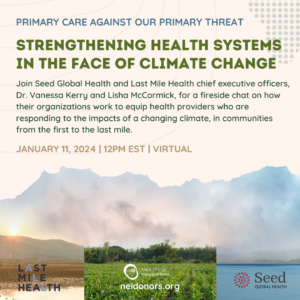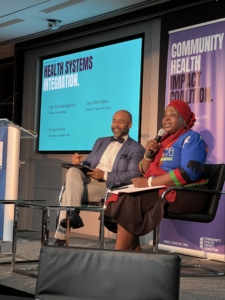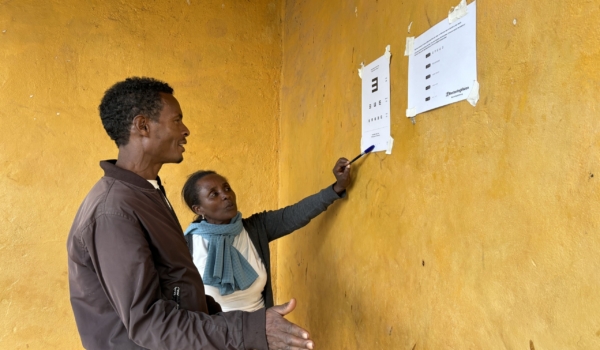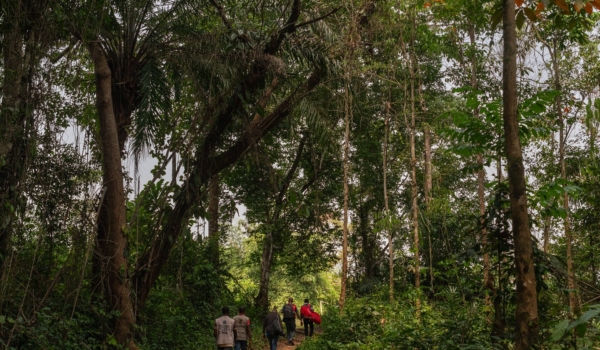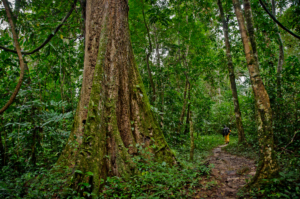
For people living in remote communities—like Zeagbeh in Liberia’s Grand Gedeh County—community health workers can ensure routine care continues even during climate emergencies.
The recent United Nations Climate Change Conference (COP28) included the first-ever COP Health Day and a historic health declaration signed by more than 140 countries. It was a crucial step forward in recognizing that climate change is the greatest threat to human health. However, as Malawi’s Minister of Health, Hon. Dr. Khumbize Kandodo Chiponda said, “We have talked enough. We need action and action and action.” Now, it’s time to translate these commitments into action for patients living in rural and remote communities across Africa, who face the brunt of climate change while contributing the least to global emissions.
On January 11, 2024, the Network of Engaged International Donors hosted a virtual dialogue, “Strengthening health systems in the face of climate change,” to emphasize the urgent action needed at the intersection of climate and health. Speakers included:
- Malawi Minister of Health Hon. Dr. Khumbize Kandodo Chiponda
- Last Mile Health CEO Lisha McCormick
- Seed Global Health CEO and WHO Director-General Special Envoy for Climate Change and Health Dr. Vanessa Kerry
- Godley Family Foundation Executive Director Ashley Barrett
- Director and Associate Dean of the School of Population and Global Health at McGill University and Last Mile Health Board of Directors member Dr. Tim Evans
Together, they highlighted the critical work of the health providers who are responding to the impacts of a changing climate in communities from the first to the last mile—and underscored the critical need to invest in the health workforce.
“Climate change is not a distant threat, it is already here with us. It is affecting not only the environment but also the health and well-being of our communities.” – Minister Chiponda
In her remarks, Minister Chiponda detailed the impacts of climate change on Malawi’s health sector, including increased instances of climate-sensitive diseases like cholera and malaria, disruptions to continuity of essential care like reproductive health services, loss of medical equipment and supplies, and damaged health infrastructure.
Minister Chiponda also highlighted actions Malawi is taking to combat health threats from climate change, such as mobilizing domestic and international resources to implement preparedness and response strategies, enhancing collaboration between the health and environment sectors, and increasing the capacity of health workers.
Finally, she called on donors to support the Malawi government’s strategic plans under a “one plan, one budget” approach. “We have identified our priorities,” she said. “We already know what we need to do.”
“The best emergency response is a strong primary system that can be mobilized in times of crisis.” – Lisha McCormick
In discussion with moderator Ashley Barrett, panelists Lisha McCormick, Dr. Vanessa Kerry, and Dr. Tim Evans reiterated that the climate crisis is a health crisis. “You pick any aspect of health, and it’s being accelerated by climate change,” noted Dr. Kerry. A sobering report released at the 2024 World Economic Forum predicts that by 2050, climate change may cause an additional 14.5 million deaths worldwide. Climate change is also exacerbating the social determinants of health, making it harder for individuals to access clean water or nutrition, continue their livelihoods, or even stay in their homes, as the number of climate migrants is estimated to grow to 1.2 billion by 2050.
The panelists also emphasized the vital importance of community and frontline health workers, who can effectively respond to health emergencies from disease outbreaks to floods and droughts, as well as maintaining access to essential care. To effectively address the impacts of climate change, investment is urgently needed to train more health workers and strengthen the systems that support them.
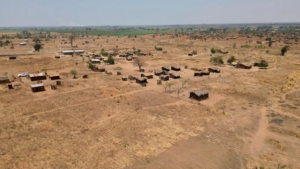
Remote communities in rural regions such as Malawi’s Salima District face the brunt of climate change.
“In the fight against climate change, philanthropy has the opportunity to be catalytic, flexible, and fast.” – Dr. Vanessa Kerry
Panelists highlighted the crucial role of the donor community in responding to Ebola during the 2014-2016 epidemic in West Africa. They emphasized the similar role those donors can play now, providing nimble capital, funding innovative approaches, and developing proofs of concept that can attract institutional funding for climate solutions.
“Leadership unleashed on the frontlines and appropriately supported is going to generate more innovation than anyone could sitting in Doha or any capital of the world. Give people room to run, some flexibility, and some trust.” – Dr. Tim Evans
Vulnerable communities are disproportionately impacted by a changing climate. Panelists urged the global community to generate the will to mitigate carbon emissions and to help communities adapt to the health impacts of climate change. To drive that adaptation, panelists underscored the importance of local expertise and innovation.

